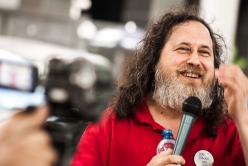
Education uses a faulty Creative licence, by Richard Stallman
Card's author :
Hélène Laxenaire - SupAgro Florac
Card's type of licence :
Creative Commons BY-SA
Ideas developped by the author in the field of cooperation within the book or conference :
In this article, Richard Stallman denounces the use of CC-BY-NC and CC-BY-NC-SA licences for pedagogical documents and works of reference and makes a call to use CC-BY and CC-BY-SA instead
He therefore distinguishes works used for practical purposes, i.e. pedagogical documents such as artistic works, entertainment from those reflecting a point of view. These are legitimized to be protected by a non-free Creative Commons licence.
Note from the author of this factsheet: the article by Richard Stallman is published under a non-free licence, which is in line with his discourse, since it is an article expressing an opinion.
Photo credits: Preliminares 2013 (CC BY-SA)
Free Creative Commons licences and other non-free ones
Among the licences provided by Creative Commons, two of them are really free (cf. the definition of the GNU project software) :- the CC-BY-SA licence, which authorises users to disseminate and modify, even in a commercial framework, but with the condition that the delivered work is under the same licence
- the CC-BY licence is identical to the one above, except that there is no obligation for a licence for delivered works
Works under CC-BY-NC and CC-BY -NC-SA licenses are at risk of not being disseminated in a commercial framework
Licenses that allow modifications but don't allow using them in a commercial framework (CC-BY-NC and CC-BY-NC-SA) can be a problem that worsens with time. In fact, the letters NC (non-commercial) of the Creative Commons licence do not strictly speaking prohibit its commercial use; it only requires that the people wanting to give a commercial use to the works under this licence ask for the author's authorisation. However, allowing modifications to the work multiplies the number of authors, a number that over time may become very large and it may be utterly impossible to contact them to require authorisation. Richard Stallman suggests modifying these licences so that they allow defining a person who may be contacted for authorisation.Works to be used for practical purposes must be under a free licence
According to Stallman, a work that is to be given a practical use must be free, as is the case of software or courses. For them to be free, users must have full control over the work they are using to fulfil their task.He therefore distinguishes works used for practical purposes, i.e. pedagogical documents such as artistic works, entertainment from those reflecting a point of view. These are legitimized to be protected by a non-free Creative Commons licence.
Note from the author of this factsheet: the article by Richard Stallman is published under a non-free licence, which is in line with his discourse, since it is an article expressing an opinion.
Photo credits: Preliminares 2013 (CC BY-SA)
Short introduction of the book's author :
Richard Stallman is a renowned free software programmer. He is behind the GNU project and the general public licence GNU is also known by its acronym GPL; he is one of the fathers of free software.
Quotations :
When a work is used for a practical purpose, users must have control over this task, and therefore must be able to control the work in itself. This applies both for teaching materials and software. Richard Stallman
Literature references :
L’éducation utilise une licence Creative Commons défectueuse, par R. Stallman. Framablog [online]. 31 January 2013. [Accessed 4 February 2014]. Available from : http://www.framablog.org/index.php/post/2013/01/31/stallman-creative-commons-non-commercial.
